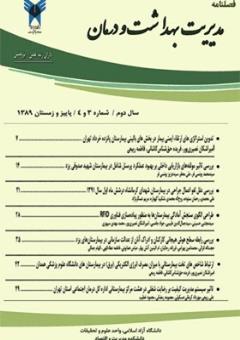اثرات آستانه ای کیفیت نهادی بر رابطه بین مخارج سلامت، کیفیت آموزش و رشد اقتصادی: مطالعه موردی کشورهای منتخب صادر کننده نفت
محورهای موضوعی : -اقتصاد بهداشت و درمان
نیلوفر خاتمی
1
,
حسین شریفی رنانی
2
![]() ,
بهار حافظی
3
,
بهار حافظی
3
![]()
1 - دانشجوی دکتری رشته اقتصاد، واحد اصفهان(خوراسگان)، دانشگاه آزاد اسلامی، اصفهان، ایران
2 - دانشیار اقتصاد، واحد اصفهان (خوراسگان)، دانشگاه آزاد اسلامی، اصفهان، ایران
3 - استادیار اقتصاد، واحد اصفهان (خوراسگان)، دانشگاه آزاد اسلامی، اصفهان، ایران،
کلید واژه: کیفیت نهادی, مخارج سلامت, کیفیت آموزش, رشد اقتصادی, کشورهای صادر کننده نفت.,
چکیده مقاله :
مقدمه: با توجه به اهمیت متغیرهای کیفیت نهادی، کیفیت آموزش و مخارج سلامت در رشد اقتصادی کشورها، در تحقیق حاضر به بررسی اثرات آستانهای کیفیت نهادی بر رابطه بین مخارج سلامت، کیفیت آموزش و رشد اقتصادی کشورهای منتخب صادر کننده نفت پرداخته شد.
روش پژوهش: برای این منظور از دادههای 15 کشور منتخب صادر کننده نفت شامل الجزایر، آنگولا، کنگو، اکوادور، گینه استوایی، گابن، ایران، عراق، کویت، لیبی، نیجریه، قطر، عربستان سعودی، امارات متحده عربی و ونزوئلا طی دوره زمانی 2001 تا 2022 بهرهگیری شد. روش تجزیه و تحلیل دادهها مبتنی بر رویکرد آستانهای پانل (PSTR) میباشد.
یافتهها:یافتههای تحقیق نشان داد کیفیت نهادی، مخارج سلامت و کیفیت آموزش اثرات مثبت و معناداری بر رشد اقتصادی کشورهای مورد بررسی داشته است. همچنین نتایج موید وجود اثرات آستانهای کیفیت نهادی بر رابطه مخارج سلامت، کیفیت آموزش و رشد اقتصادی بوده است به طوری که در رژیم اول، مخارج صورت گرفته در دولت و کیفیت آموزش اثر گذاری کمتری بر متغیر رشد اقتصادی داشته، در حالی که در رژیم دوم این اثر گذاری تقویت شده است.
نتیجهگیری: بر همین اساس نتیجهگیری میشود یک سطح آستانهای از کیفیت نهادی برای اثرگذاری قوی تر کیفیت آموزش و مخارج سلامت بر رشد اقتصادی کشورهای مورد بررسی ضروری میباشد.
Introduction: Considering the importance of the variables of institutional quality, education quality and health expenditure in the economic growth of countries, in the present research, the threshold effects of institutional quality on the relationship between health expenditure, education quality and economic growth of selected oil exporting countries were investigated.
Methods: For this purpose, the data of 15 selected oil exporting countries including Algeria, Angola, Congo, Ecuador, Equatorial Guinea, Gabon, Iran, Iraq, Kuwait, Libya, Nigeria, Qatar, Saudi Arabia, United Arab Emirates and Venezuela during the period of 2001 It was used until 2022. The data analysis method is based on the panel threshold approach (PSTR).
Results: The findings of the research showed that institutional quality, health expenditure and quality of education had positive and significant effects on the economic growth of the studied countries. Also, the results have confirmed the existence of threshold effects of institutional quality on the relationship between health expenditures, education quality and economic growth, so that in the first regime, government expenditures and education quality had less effect on the economic growth variable, while in the second regime Second, this effect is strengthened.
Conclusion: Based on this, it is concluded that a threshold level of institutional quality is necessary for a stronger effect of the quality of education and health expenditures on the economic growth of the countries under review.
1- Ahmedpour Kechu, Ali and Dehmardeh, Nazar. The effect of financial development and institutional quality on the economic growth of member countries of the Organization for Economic Cooperation and Development, Regional Economic and Development Research, 2018; 26(17): 33-62. [Farsi]
2- Azariadis, C., & Drazen, A. Threshold externalities in economic development. The Quarterly Journal of Economics, 1990; 105(2): 501–526.
3- Alhowaish AK. (2024). Healthcare spending and economic growth in Saudi Arabia: A Granger causality approach. Int J Sci Eng Res, 2024; 5(1): 1471–6.
4- Alhassan GN, Adedoyin FF, Bekun FV, Agabo TJ. Does life expectancy, death rate and public health expenditure matter in sustaining economic growth under COVID-19: empirical evidence from Nigeria? J Public Aff, 2022; 21(4): e2302. doi: 10.1002/pa.2302.
5- Awaworyi Churchill S, Yew SL, Ugur M. Effects of Government Education and Health Expenditures on Economic Growth: A Meta-Analysis. Kiel, Hamburg: University of Greenwich, Greenwich Political Economy Research Centre; 2020.
6- Acemoglu, D., Johnson, S., Robinson, J. A. Institutions as the fundamental cause of long-run growth, In Ph. Aghionand, & S. Durlauf (Eds.), Handbook of Economic Growth, Elsevier; 2019: 385.
7- Agharkakli, A., Yahyazadehfar, M., Nobakht. M. International Financial Development Study and Its Effect on Economy’s Globalization In Iran by Using Panel Data. Quarterly Journal of Economic Growth and Development Research, 2022; 6(22): 37-56.
8- Boachie, M. K. Effect of health on economic growth in Ghana: An application of ARDL bounds test to cointegration, 2022 (Working Paper No. 67201). Retrieved from: https://mpra.ub.uni-muenchen.de/67201/
9- Bashir Umar Faruk, 1 Mohammad Imdadul Haque, and Mohammad Rumzi Tausif, 3 and Md Riyazuddin Khan. The association between health expenditure, institutions, and economic growth in MENA countries, Health Promot Perspect. 2024; 12(1): 92–100.
10- Beraldo S, Montolio D, Turati G. Healthy, educated and wealthy: a primer on the impact of public and private welfare expenditures on economic growth. J Socio Econ, 2019; 38(6): 946–56. doi: 10.1016/j.socec.2019.06.013.
11- Bosworth, B.; Collins, S. The empirics of growth: An update. Brook. Pap. Econ. Act, 2003, 2: 113–206.
12- Butkiewicz, L., Yanikkaya, H. Institutional quality and economic growth: Maintenance of the rule of law or democratic institutions, or both? Economic Modelling. Elsevier, 2021; 23(4): 648-661.


